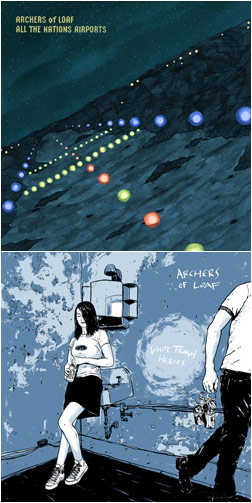
All the Nations Airports and White Trash Heroes
Merge
While All the Nations Airports’ first track, “Strangled By the Stereo Wire,” always had that lo-fi intro—no umph to the drums, no crunch in the guitars, no thunder in the thunderstick—hearing the newly remastered Bob Weston version kick in, albeit on my iPod, made me fearfully jump for the volume dial even quicker than when I first heard it nearly blow my speakers in 1996. I had seriously over-saturated my turntable time with the first two records and, I admit, I wasn’t really that excited for this record. Unlike the two reissues before this one, I didn’t really have all that much nostalgia piled up. For some reason, ATNA sounds to me like a record that just came out, and it speaks to me the way a record about disillusionment with playing music for peanuts and burning the candle at both ends just to afford a candle to burn in your shitty rental apartment could never have spoken to a 17-year-old burnout. The lines “Little things can cost you everything. Save your life,” from “Rental Sting” seem much more pertinent than I’d ever imagined they would.
ATNA was Archers’ first long-player distributed by a major, Elektra, and while it was still on Alias, it was effectively Elektra’s stab at making the band palatable to the moneyed MTV generation’s alternative fanbase. This is clearly why the 2:43-long “Vocal Shrapnel” was the single, when in the scheme of the whole record, it comes off as filler. I sure don’t remember hearing it on the alternative radio station back then, that’s for sure, but this remastered version has promise. Those knifey, treble-attack guitars are much sharper, and the drums sound like they belong in the same room. In all honesty, the next track, “Bones of Her Hands,” could have been the radio hit that pushed the band out of day job territory. The overlooked gem, instrumental “Acromegaly,” sounds even bigger than I remember—this remastering business is really getting to be worth the trouble. The reissue has more extra tracks than the original release, which can really become a burden for the fan that approves of an artist’s ability to edit their sequencing. Fortunately, Archers added “Little Jets,” a truly, previously unreleased B-side, in order to offset the painfully rough production of the rest of the extras. They’re all rehearsal space, four-track demos of the rest of the record, and unfortunately, they pale horribly (I can’t stress this enough) in comparison to the Weston-produced and remastered tracks. They’re not a painful listen—the band is tight and all the sounds are there—but christ, if you shined off the turd from the boots, why include the pile from whence they stepped? This is something I’ve never properly understood about reissues. Is it to make the remastered music sound even more remastered in comparison to the demos?
On to White Trash Heroes, the definitively difficult final record on which Archers took a completely different tack to songwriting. Instead of writing live, they pieced the songs together in the studio. While this can work with less conventional artists—and in some cases, is the crowning achievement of those artists—with straight rock bands like Archers, it can quickly become a full on disaster. On first listen years ago, I put this record back on the shelf, and it wasn’t until I’d acquiesced and dubbed it from a friend that I decided to give it a fair shake. “I.N.S.” is still the only song on the album worth putting on a mixtape or spinning at a bar at night. Here, it sounds crunchier, with more potency than that first release. “Perfect Time” and “Slick Tricks and Bright Lights” are basically precursors to what would become Eric Bachman’s inspired solo project, Crooked Fingers. Here the extra four-track versions make more sense, as they show they way the band ended up constructing the songs as opposed to superfluous, note-perfect rehearsal takes. “Slick Tricks” actually sounds the way I sort of hoped the rest of the record would have sounded: live and a little drunk and sloppy with audible cues from Bachman (probably) to the rest of the band. One can’t fault a group that had grown slightly bored with the rigmarole of writing, recording, touring, and repeating for stretching their skills into the realm of the unknown. Sometimes, though, the clear reason to keep a sketchbook for work on a masterpiece becomes painfully obvious. These four-track outtakes are that sketchbook, as opposed to just unrefined run-throughs, and are much more interesting for it. The band is tighter, and it’s obvious they’ve become professional musicians, if not for their paychecks, then for their skill and aptitude. Then, at the very end, we’re treated to a batshit crazy unreleased B-side, “Whooh!,” which makes me want to sell all my bicycles to fund my knee surgery so I can skate to Archers of Loaf records on my headphones again. This capstone makes these two reissues worth it, despite the cool reworked album covers and the properly cooked meat and potatoes with garnish remastering.
Michael P. O’Shaughnessy
PAST PERFECTS
Can, The Lost Tapes
Sugar
The English Beat, The Complete Beat
The Guns
Lost Sounds, Lost Lost: Demos, Sounds, Alternate Takes & Unused Songs 1999-2004
This Ain't Chicago
Factrix
Silver Jews, Early Times
Codeine, When I See the Sun
Paul Simon, Graceland
Germs, (GI)
Eccentric Soul: A Red Black Green Production
David Kilgour, Here Come the Cars
We've Got a Fuzzbox and We're Gonna Use It
